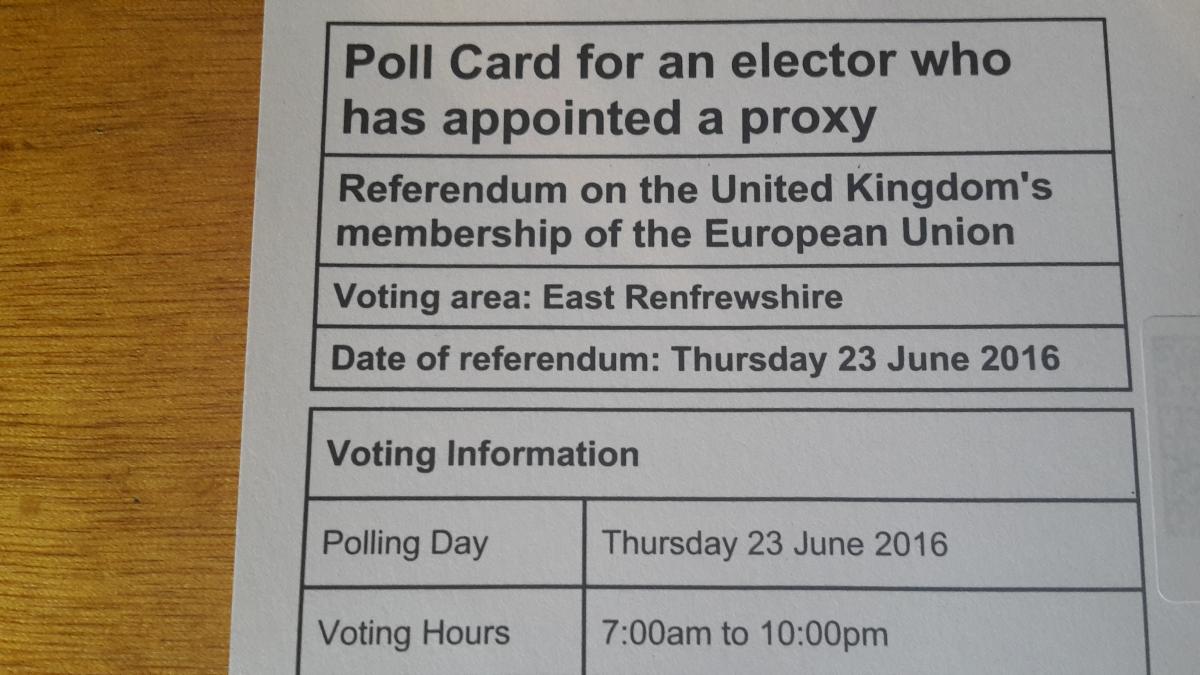Sun, 06/26/2016 - 13:57
The trouble with asking the people: Thoughts on EU referenda past and present
I’ve never been a fan of referenda, especially on Europe. This dates back to May 2005, when France held a referendum on the European Constitution. The text aimed to consolidate existing EU treaties, simplify EU governance post-enlargement and give legal force to the EU’s Charter of Fundamental Rights. All fairly sensible things, you could argue.
As you may remember, French voters rejected said constitution by a 55% margin, on a turnout of 69%. Three days later, Dutch voters rejected the same treaty. Both countries are of course founding members of what is now the European Union.
So in a way, the disastrous result of the UK’s referendum on EU membership, with 52% of voters backing the dreaded Brexit, has a sense of déjà vu for me. Well, up until a certain point.
Let’s start with the similarities. The very act of holding a referendum is inherently risky, as both then-president Jacques Chirac and now PM David Cameron have found out the hard way (although only Cameron lost his job over it). You’re asking voters to decide on something that can be difficult to explain or grasp, expect them not to use it as an opportunity to snub you, and still expect them to give you the right answer? Even the French said “non”.
 The very act of holding a referendum is inherently risky.
The very act of holding a referendum is inherently risky.
Photo: Caroline Clarkson
Back in 2005, the same expression was repeated ad nauseam on the French news after the shock result. “Les Français ont confondu les enjeux” (The French mistook what was at stake), the commentators declared, a little pompously. But they were right. Many voters used the opportunity to snub Chirac and the government of the somewhat hapless prime minister of the time, Jean-Pierre Raffarin. Chirac stayed on, weakened, but Raffarin resigned following the result.
However, this only explains half the story. Just as Britain’s Conservative Party was bitterly split over the UK’s EU referendum, France’s Socialist Party, then in opposition, was deeply divided over the 2005 treaty, with several key figures breaking ranks to campaign against it. Some French voters on the left rejected the text because they, like those politicians, saw it as overly free-market in nature. Meanwhile, there was controversy in France over an EU directive aimed at establishing a single market for services within the bloc, known as the Bolkestein Directive. This was used by the “no” camp as an argument against the treaty, whipping up fears of a “Polish plumber” who would come to take French jobs.
But let’s get back to the UK. The victory of the “Leave” camp is complex and cannot be explained in one blog post. But similarities with the French vote are definitely there.
Firstly, it has emerged that some British people opted for “Leave” as a protest vote and did not actually expect that it would tip the balance. Perhaps they forgot that every vote really does count in a referendum, unlike in a British general election where there is a “first past the post” system. Of course, like I say, the French referendum in 2005 had a strong protest vote element about it too. But this time the stakes were much, much higher.
Secondly, a lot of people seem to have voted in favour of Brexit due to concerns about immigration, stoked by the “Leave” camp and blamed on the EU. This is politics at its worst, playing on people’s basest fears and xenophobia. It seems ironic that the “Remain” camp was accused of peddling “Project Fear” for issuing dire warnings about the economy which are in the process of coming true. If anything, it’s the other side that actually campaigned on a platform of fear. Again, there is certainly a parallel to be made with those French voters who, back in 2005, worried that France would see an influx of Polish plumbers, fears which turned out to be largely unfounded.
But more than anything – and this where the similarities with the French vote end - Brexit seems to be a victory of politicians’ lies. From the comical to the extreme, the “Leave” side twisted the facts and downplayed experts’ warnings in order to suit its own agenda – namely, getting a taste of power. Sadly, it worked. Again, this is pure realpolitik. Conservative MP Boris Johnson, who was the chief campaigner for “Vote Leave”, knows how to charm an audience and his patriotic argument that the UK could manage just fine on its own seems to have struck a chord with voters. Some have rightly questioned just how Eurosceptic he really is, seeing the “Leave” campaign as simply a vehicle for his own political ambitions – namely, becoming prime minister. Since the result was announced, the “Leave” campaign has already backtracked on several key campaign promises, leading some voters who backed it to regret their choice in horror. But it’s too late.
In short, asking the people to give the right answer is always going to be tricky, especially with a campaign as divisive as the one the UK has just experienced. Am I saying the people shouldn’t decide? Well, that’s ultimately what happened with the European Constitution. After the French and Dutch voted “no” in 2005, the text was later repackaged as the Treaty of Lisbon, which came into force in 2009. Only one EU country – Ireland – put it to referendum, because it was legally obliged to, and the vote had to be held twice until the Irish gave the right answer.
Perhaps it really is easier not to ask the people in the first place.
As you may remember, French voters rejected said constitution by a 55% margin, on a turnout of 69%. Three days later, Dutch voters rejected the same treaty. Both countries are of course founding members of what is now the European Union.
So in a way, the disastrous result of the UK’s referendum on EU membership, with 52% of voters backing the dreaded Brexit, has a sense of déjà vu for me. Well, up until a certain point.
Let’s start with the similarities. The very act of holding a referendum is inherently risky, as both then-president Jacques Chirac and now PM David Cameron have found out the hard way (although only Cameron lost his job over it). You’re asking voters to decide on something that can be difficult to explain or grasp, expect them not to use it as an opportunity to snub you, and still expect them to give you the right answer? Even the French said “non”.

Photo: Caroline Clarkson
Back in 2005, the same expression was repeated ad nauseam on the French news after the shock result. “Les Français ont confondu les enjeux” (The French mistook what was at stake), the commentators declared, a little pompously. But they were right. Many voters used the opportunity to snub Chirac and the government of the somewhat hapless prime minister of the time, Jean-Pierre Raffarin. Chirac stayed on, weakened, but Raffarin resigned following the result.
However, this only explains half the story. Just as Britain’s Conservative Party was bitterly split over the UK’s EU referendum, France’s Socialist Party, then in opposition, was deeply divided over the 2005 treaty, with several key figures breaking ranks to campaign against it. Some French voters on the left rejected the text because they, like those politicians, saw it as overly free-market in nature. Meanwhile, there was controversy in France over an EU directive aimed at establishing a single market for services within the bloc, known as the Bolkestein Directive. This was used by the “no” camp as an argument against the treaty, whipping up fears of a “Polish plumber” who would come to take French jobs.
But let’s get back to the UK. The victory of the “Leave” camp is complex and cannot be explained in one blog post. But similarities with the French vote are definitely there.
Firstly, it has emerged that some British people opted for “Leave” as a protest vote and did not actually expect that it would tip the balance. Perhaps they forgot that every vote really does count in a referendum, unlike in a British general election where there is a “first past the post” system. Of course, like I say, the French referendum in 2005 had a strong protest vote element about it too. But this time the stakes were much, much higher.
+++ #EUref to be re-run with improved ballot paper as not all voters were aware that their vote actually counts. +++ pic.twitter.com/LuWHwo98yg
— Andreas Kyriacou (@andreaskyriacou) 24 juin 2016
Secondly, a lot of people seem to have voted in favour of Brexit due to concerns about immigration, stoked by the “Leave” camp and blamed on the EU. This is politics at its worst, playing on people’s basest fears and xenophobia. It seems ironic that the “Remain” camp was accused of peddling “Project Fear” for issuing dire warnings about the economy which are in the process of coming true. If anything, it’s the other side that actually campaigned on a platform of fear. Again, there is certainly a parallel to be made with those French voters who, back in 2005, worried that France would see an influx of Polish plumbers, fears which turned out to be largely unfounded.
But more than anything – and this where the similarities with the French vote end - Brexit seems to be a victory of politicians’ lies. From the comical to the extreme, the “Leave” side twisted the facts and downplayed experts’ warnings in order to suit its own agenda – namely, getting a taste of power. Sadly, it worked. Again, this is pure realpolitik. Conservative MP Boris Johnson, who was the chief campaigner for “Vote Leave”, knows how to charm an audience and his patriotic argument that the UK could manage just fine on its own seems to have struck a chord with voters. Some have rightly questioned just how Eurosceptic he really is, seeing the “Leave” campaign as simply a vehicle for his own political ambitions – namely, becoming prime minister. Since the result was announced, the “Leave” campaign has already backtracked on several key campaign promises, leading some voters who backed it to regret their choice in horror. But it’s too late.
Boris has spent the last few weeks touring the UK using made-up facts. #EUDebate pic.twitter.com/unNG6fwpzM
— Stronger In (@StrongerIn) 14 juin 2016
In short, asking the people to give the right answer is always going to be tricky, especially with a campaign as divisive as the one the UK has just experienced. Am I saying the people shouldn’t decide? Well, that’s ultimately what happened with the European Constitution. After the French and Dutch voted “no” in 2005, the text was later repackaged as the Treaty of Lisbon, which came into force in 2009. Only one EU country – Ireland – put it to referendum, because it was legally obliged to, and the vote had to be held twice until the Irish gave the right answer.
Perhaps it really is easier not to ask the people in the first place.
Tags for all blogs :
Comments or opinions expressed on this blog are those of the individual contributors only, and do not necessarily represent the views of FRANCE 24. The content on this blog is provided on an "as-is" basis. FRANCE 24 is not liable for any damages whatsoever arising out of the content or use of this blog.




1 Comments
Post new comment